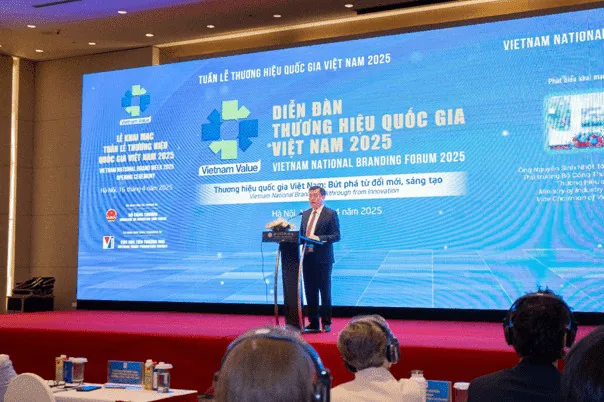Vietnam taps innovation, global ties to elevate national brand
Vietnam is intensifying efforts to enhance its national brand, leveraging innovation, global partnerships, and strategic policies to bolster its global competitiveness and market presence.
THE HANOI TIMES — Vietnam needs to strengthen its global market competitiveness by empowering small and medium-sized enterprises (SMEs) to overcome language, marketing and technology barriers, said Bok Dug Gyou, Head of Vietrade's Korea Desk and Deputy Director of KOTRA Hanoi.
He made the remarks at the Vietnam National Brand Forum 2025, themed "Breakthrough from Innovation," part of the opening ceremony of Vietnam National Brand Week 2025, which runs from April 16-21. The program places innovation at the heart of Vietnam's efforts to boost the competitiveness of its enterprises and the country's prestige on the global stage.

Representatives of the Ministry of Industry and Trade and international organizations at the opening ceremony of Vietnam National Brand Week 2025. Photos: moit.gov.vn
Bok Dug Gyou stressed the need for Vietnam to adopt a globalized financial policy. He noted that South Korea has spent hundreds of millions of US dollars to support its enterprises, and other countries should also review their globalization budgets to remain competitive.
He recommended that Vietnam enhance collaboration between government, businesses, and universities. Inviting industry experts to lecture at universities would help align education with real-world demands.
Bok Dug Gyou also underscored the importance of culture, sports, and diplomacy in building a strong national brand.
South Korea's global brand identity is the result of more than 70 years of consistent effort, with strong government support helping companies reshape global markets. The national brand is built on pillars such as technological innovation, education, industrial strength, export-led growth, modern infrastructure and global diplomacy, he said.
Bok Dug Gyou noted that major events like the Olympics and the World Cup, as well as cultural icons like the K-pop band BTS, have helped position South Korea as a cultural leader. However, older slogans such as "Dynamic Korea" and "Creative Korea" have become too vague. The country is now embracing the "K-brand" strategy to help SMEs compete and gain global market share.
Meanwhile, Nguyen Viet An, Director of the Innovation Center of the State Agency for Technology Innovation, outlined key strategies to drive innovation and strengthen the global competitiveness of Vietnamese enterprises. He emphasized that instead of solely focusing on how to build a global brand, enterprises must first understand why it matters.
Defining this purpose, An noted, can rally leadership and employees around a shared vision, fueling long-term brand development and identity.
He also urged companies to take advantage of international networks, including global organizations, embassies, and the Vietnamese diaspora. An stressed the importance of leveraging free trade agreements and global integration to enhance competitiveness. "Companies need to identify core values to guide sustainable growth amid rapid technological changes," An suggested.
Innovation-driven branding takes center stage

Nguyen Sinh Nhat Tan, Deputy Minister of Industry and Trade, speaks at the forum.
Speaking at the opening ceremony of Vietnam National Brand Week 2025, Nguyen Sinh Nhat Tan, Deputy Minister of Industry and Trade and Vice Chairman of the National Brand Council, said that a national brand is a strategic intangible asset that reflects a country's overall competitiveness and global standing.
"With Vietnam's shift to a science and innovation-based growth model, building a strong national brand has become even more urgent," said Tan.
According to Brand Finance, Vietnam’s national brand was valued at US$507 billion in 2024, ranking 32nd in the world, up one position from 2023. Deputy Minister Tan described this as a "proud achievement" that reflects the effectiveness of Vietnam's economic and integration policies.
"This year's forum provided a platform for policymakers, experts, academics and business leaders to share insights and develop solutions to enhance Vietnam's brand on the global stage," said Tan.
Hoang Minh Chien, Deputy Director of the Vietnam Trade Promotion Agency, said registration in the National Brand Program has been steadily increasing. In 2024, 190 enterprises had products recognized with the Vietnam National Brand, six times higher than the number in 2008, when the program was first launched.
"Thanks to the program's support, many Vietnamese enterprises now realize the strategic importance of brand development. They have seriously invested in both product and corporate branding," he said.
Among Vietnam’s top 50 most valuable brands in 2024, 23 carried the national brand label, a 15% increase over 2023. Notably, eight out of the top ten brands were Vietnam National Brand products, accounting for 88.8% of the combined brand value. Several of these have gained global stature.
However, it remains a challenge for most enterprises, especially SMEs, to undertake innovation. The Vietnam Trade Promotion Agency reported that the average R&D expenditure of Vietnam National Brand enterprises is 2.6% of sales, compared to 1.6% for Vietnamese companies overall.
The Vietnam Open Innovation Ecosystem Report 2023 found that Vietnam's total R&D investment was only 0.4% of GDP, compared to 1.3% in Thailand, 2.2% in Singapore, 1% in Malaysia, 2.64% in China, and 3.7% in Japan.












